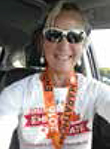
Sleep, Eat, Exercise: New Habits for 2023
Q: Weeks into the new year, again I find that my resolutions about making changes to my eating and exercise habits have already failed. How can I change this cycle?
A: The skills of figuring out what to do and following a plan are not the same as the skills needed to change old behavior patterns and follow a new plan. It’s important to find an eating and exercise plan that is individualized to your body and life rather than one that’s not the right fit. My first coaching advice is to either get at least two corroborating opinions that what you’re attempting to follow is right for you or you’re working with someone who has done testing or evaluations, so you are confident that the plan you are given is specific to you. Trying to follow a one-size-fits-all program can be a major factor in failing to follow it.
Second, once you have an individualized plan for your stage of life and goals, pay attention to the self-talk that goes on in your brain as you follow it in the early phases. We often have cognitive dissonance, which is two competing belief systems or mind-sets at the same time. To arrive at a solution to the cognitive dissonance that leads you off your plan, you need to identify the conflicting beliefs and then either get additional information or decide which belief you choose to follow. For example, you decide following a no- or low-carb plan isn’t what you are willing to do and replace the rules of the plan to include moderate carb intake when out to dinner. No more dissonance and most likely a better weight management outcome.
Third, if the above steps are not the issue, failed compliance may be what I call the all-or-nothing approach. You think, “I either follow 100 percent or if not then I fall off 100 percent.” A solution is to adapt your 100-percent-on, 100-percent-off operating system to something less rigid and unsustainable. This way your 2023 can be the year you make the progress you desire sustainably!
Q: I find that although I am exhausted and tired all the time, I still am unable to fall asleep at night or wake up and can’t get back to sleep. What can I do about it?
A: This can be a symptom of menopause due to hormonal shifts with estrogen and progesterone and their effects on other hormones such as melatonin and cortisol, but because I observe this in clients of all ages and genders, there are other factors involved that may be more easily addressed. Melatonin may help if your circadian sleep cycle has been interrupted or confounded by travel across time zones or work shift schedules, but for most of us, these are not the circumstances.
Research by Dr. Andrew Huberman, Stanford University, indicates sleep disturbances are related to melatonin levels, but taking the supplement may not offset the actual cause of the sleep disruption. According to his research and theories, sleep and melatonin are being disrupted by a corruption to the circadian rhythm of daylight in our contemporary lives. Many of us wake up in the dark and go to bed way past darkness because we have the benefit of electric lights. Waking up in the dark or not being exposed to daylight early enough in the day throws off the circadian rhythm having to do with awake and daylight. This has a residual effect at the end of the day and causes sleep disruption. If we’re not exposed to bright daylight early enough in the morning, our circadian rhythm of melatonin and other hormones gets delayed and we will feel the effects at night when we try to go to sleep because the later morning daylight is causing a delay to the desired night sleep time. The good news is that alarm clocks are available that wake you up to sound and also have a light that progressively brightens as the alarm sounds, exposing you to bright light as soon as you awaken, which trips the switch at the right time to help you fall asleep soundly later.
By Judy Torel

Judy Torel, owner of Judy Torel Fitness, is degreed, certified and credentialed in every discipline involved in changing habits that result in body changes. She holds certification through ACSM as an exercise specialist, nutrition certification through Precision Nutrition and a master’s degree from UAlbany in counseling psychology with a specialty in addictive behaviors. Judy is also a certified yoga instructor through Yoga Alliance and teaches meditation, breathing and physical yoga practice for stress and anxiety management. Recently, she became a certified health coach through Institute of Integrative Nutrition. As an eight-time Ironman triathlete, she has dedicated her life to sharing the knowledge she has ascertained through her own experiences. Visit judytorel.com or call 518-469-0815 for more information about classes and her studio.
518-469-0815 | judytorel.com








